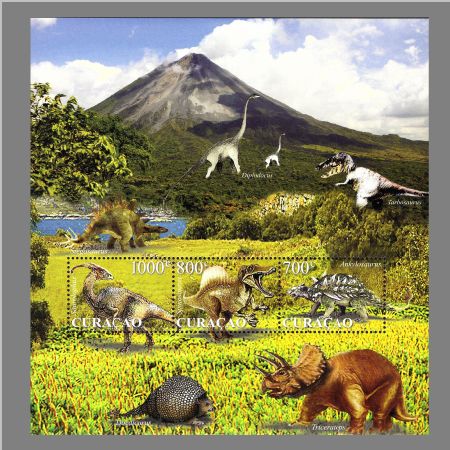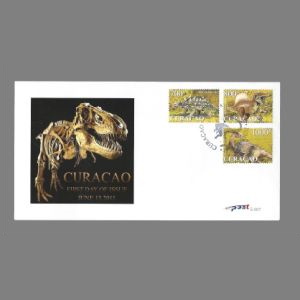Curacao 2011 "Prehistoric Animals"
| <prev | back to index | next> |
| Issue Date | 13.06.2011 |
| ID | Michel: 38-40, Bl. 2; Scott: Stanley Gibbons: Yvert: Category: pF |
| Design | Ans Mezas-Hummelink |
| Stamps in set | 3 |
| Values |
1000c - Saurolophus 800c - Spinosaurus 700c - Ankylosaurus |
| Emission/Type | commemorative |
| Places of issue | |
| Size (width x height) | 36 mm x 25 mm |
| Layout | Mini-Sheet of 3 stamps |
| Products | FDC x1 |
| Paper | coated stamp paper no watermark |
| Perforation | 13,25x12,75 |
| Print Technique | Offset |
| Printed by | Jofan Enschede Stamps Security Printers, Haarlem, The Netherlands |
| Quantity | |
| Issuing Authority | Nieuwe Post |

Prehistoric animals are all organisms that walked or swam, crawled, slithered, or flew on the earth moret than 5,500 years ago, before humans. Nieuwe Post with great pleasure is presenting this 3 stamps block, in honor of these creatures that represent the vast majority of extincted animals, even though no fossil remains of these giants can be found on the island, though, because at that time a 5 kilometer deep ocean marked the position of the Island to be.
The 1000c stamp depicts an individual of the genus Saurolophus. Saurolophus means "lizard crest". It was a genus of large hadrosaurine duckbilled dinosaur that lived approximately 69.5 to 68.5 million years ago during the Late Cretaceous of North America (Canada) and Asia (Mongolia). It is one of the few dinosaur genera known from multiple continents. Saurolophus was an herbivorous dinosaur which could have moved bipedally (on two legs) or quadrupedally (on four legs). The crest of its head was hollow, and connected to the nasal passages, and thus could have been used to make sounds. Saurolophus could use these sounds to communicate within its herds, for example to warn of approaching predators.
The 800c stamp shows an individual of Spinosaurus. Spinosaurus means "spined lizard" and is a genus of theropod dinosaur that lived in what is now Northern Africa, from the Lower Albian to Lower Cenomanian stages of the Cretaceous period, 122 to 97 million years ago. The original remains were destroyed during World War II, but additional material has come to light in recent years. Spinosaurus may be the largest of all known carnivorous dinosaurs. Spinosaurus is thought to have eaten fish; evidence suggests that it lived both on land and in water like modern crocodiles.
700c stamp depicts Ankylosaurus. Ankylosaurus means "fused lizard", which is a genus of ankylosaurid dinosaur, containing one species, Ankylosaurus.magniventris. Although a complete skeleton has not been discovered and several other dinosaurs are represented by more extensive fossil material, Ankylosaurus is often considered the archetypal armored dinosaur. Other Ankylosaurids shared its well-known features, the heavily-armored body and massive bony tail club-but Ankylosaurus was the largest known member of the family.
Products and associated philatelic items
| FDC | ||
 |
|
|

|
References
Christoffel Park, Info page of Curacao Post.Acknowledgements
Many thanks to Dr. Peter Voice, PhD Department of Geological and Environmental Sciences, Western Michigan University, USA, for his help in finding information and for review of a draft of this article.| <prev | back to index | next> |